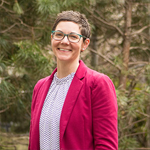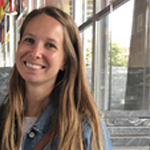Fall 2020.
Join us every Friday (during the semester) from 12:45-1:45 pm online unless otherwise indicated.
Fall 2020 Schedule Summary |
||
| Date | Speaker | Seminar Titles/Topics |
| Sep 11th | Liz Harriman Deputy Director Toxics Use Reduction Institute (TURI) |
“Prevention and Avoiding PFAS Regrettable Substitutes under the Massachusetts Toxics Use Reduction Act (TURA)” |
| Sep 18th | Jen Duggan
Vice President and Director Conservation Law Foundation (CLF) Vermont |
“Overview of Legal Tools to Address the PFAS ‘Perfect Storm’ and Protect Drinking Water” |
| Sep 25th | Presentations by PhD Students
Samantha Schildroth and Stephanie Grady Department of Environmental Health BUSPH |
“Metal Mixtures and the Role of Iron Status in Child Cognition: F31 Proposal” and “Relationships between Transportation Noise and Cardiovascular Health” |
| Oct 2nd | Rob Bilott
Partner, Taft Law, Taft Stettinius & Hollister LLP |
“History of PFAS ‘Forever Chemical’ Discovery, Regulation, Science, and Litigation” |
| Oct 9th | NO SEMINAR | |
| Oct 16th | NO SEMINAR | |
| Oct 23rd | Presentations by PhD Students
Beth Haley, Jennifer Oliver, and Paige Brochu Department of Environmental Health BUSPH |
“Racism & Environmental Health: An Interdisciplinary Approach to Disparities Research” |
| Oct 30th | Madeleine L. Scammell, DSc
Associate Professor Department of Environmental Health BUSPH and Chad Milando, PhD Research Scientist Department of Environmental Health BUSPH |
“Racism & Environmental Health: Departmental Discussion of our Field’s History and Future” |
| Nov 6th | Presentations on Climate and Health
Jennifer Stowell, PhD Postdoctoral Research Associate in Climate and Health Department of Environmental Health BUSPH and Matt Raifman Doctoral Student Department of Environmental Health BUSPH |
“Climate Change Impacts on Human Health: Effects of Increasing Wildfire Activity”
and “Quantifying the Health Co-Benefits of Climate Action“ |
| Nov 13th | Rachel Morello-Frosch, PhD, MPH
Professor in Department of Environmental Science, Policy and Management UC Berkeley |
“The Haves, the Have-Nots, and the Health of Everyone: Implications for Environmental Sustainability and Justice“ |
| Nov 20th | NO SEMINAR | |
| Dec 4th | Greylin Nielsen PhD Student Department of Environmental Health BUSPH and Matt Bozigar Postdoctoral Associate Department of Environmental Health BUSPH |
“Involvement of Nuclear Receptors in the Metabolic Effects of PFAS Exposure”
and “A Bayesian Spatio-temporal Analysis of Neighborhood Pediatric Asthma Emergency Department Visit Disparities” |
| Dec 11th | Dr. Sharrelle Barber, ScD, MPH
Assistant Professor Epidemiology and Biostatistics Drexel University |
“Racism in the Time of COVID-19: Reflections on Theory, Data, and Action“ |
Seminar Series
Policy Formulation Advanced by Science: The Ongoing Case of Per- and Polyfluoroalkyl Substances
Fall 2020
September 11
Speaker: Liz Harriman
Deputy Director, Toxics Use Reduction Institute (TURI)
Title: Prevention and Avoiding PFAS Regrettable Substitutes under the Massachusetts Toxics Use Reduction Act (TURA)
Summary: Every day, more PFAS are added to the environmental and human health burden; prevention policies are key to “turning off the tap.” Banning chemicals that we know are harmful often encourages businesses to move to similar chemicals that are not quite the same; this just introduces regrettable substitutes. The Massachusetts Toxics Use Reduction Program is in the process of considering the addition of a large category of PFAS to its list of Toxic or Hazardous Substances. This presents many challenges but even more opportunities!
Suggested Readings:
- TURI PFAS Policy Analysis
- TURA Scientific Review Board PFAS Review
- TURI Meeting Minutes
Bio: As Deputy Director of the Toxics Use Reduction Institute, Liz Harriman is responsible for managing the operations and technical functions of the Institute, as well as working with the other TURA agencies to set direction for the program. In her 20+ years working at the Institute, she has provided technical research and support services to Massachusetts companies with the goal of identifying safer alternatives to toxic chemicals used in manufacturing and products. Recent technical work includes prioritization and hazard evaluation of chemicals, chemical alternatives assessment, and flame retardants. Ms. Harriman is a registered Professional Engineer and holds Bachelors and Masters degrees from Cornell University in Civil Engineering and a Master’s degree in Hazardous Materials Management from Tufts University.
September 18
Speaker: Jen Duggan
Vice President and Director, Conservation Law Foundation (CLF) Vermont
Title: Overview of Legal Tools to Address the PFAS “Perfect Storm” and Protect Drinking Water
Summary: PFAS have contaminated drinking water supplies in Massachusetts and across New England. These toxic “forever” chemicals create a set of unique regulatory challenges because they pose a public health risk at low concentrations, persist in the environment, bioaccumulate, are highly mobile in water, are found in a wide variety of industrial processes and consumer goods, and number over 7,000 chemicals in the class. This seminar will provide an overview of the PFAS regulatory landscape and the role of scientists and technical experts in legal proceedings to address the widespread harm caused by these dangerous chemicals. The seminar will also explore the use of legal tools to advance protections for communities impacted by PFAS contamination, including efforts to secure drinking water rules for PFAS in Massachusetts and other New England states.
Suggested Readings:
- CLF Petition to MA DEP for Rulemaking to Establish a Treatment Technique Drinking Water Standard for PFAS (Oc.t 25, 2018)
- CLF Comments on Proposed Changes to the Massachusetts Drinking Water Standard to Establish a Maximum Contaminant Level for Six PFAS (Feb. 28, 2020) (attached)
- Act 21 (2019): https://legislature.vermont.gov/Documents/2020/Docs/ACTS/ACT021/ACT021%20As%20Enacted.pdf
- Vermont Attorney General Press Release and Legal Complaints Filed Against Manufacturers of PFAS
Bio: Jen Duggan is the Vice President and Director of CLF Vermont. Throughout her career, Jen has worked to protect public health and ensure all communities have equal access to a clean and healthy environment. Before joining CLF, Jen was the General Counsel for the Vermont Agency of Natural Resources. Prior to her position with the Agency, Jen was Managing Attorney for the Environmental Integrity Project. She managed the Coal-Free Waters Campaign and represented community groups and other organizations in permit proceedings, citizen enforcement actions, and federal and state rulemakings pertaining to coal plants, oil refineries, and other large sources of pollution. Jen developed and co-counseled litigation requiring the U.S. Environmental Protection Agency to limit toxic discharges from coal plants for the first time; developed and co-counseled litigation requiring clean up of three coal ash landfills; and persuaded a state environmental agency to withdraw construction permits for two waste coal power plants. Jen earned her JD and Master of Studies in Environmental Law from Vermont Law School. She interned for the Sierra Club Environmental Law Program in San Francisco and worked as a student clinician for the Environmental and Natural Resources Law Clinic at Vermont Law School.
September 25
Speaker: Samantha Schildroth
PhD Student
Department of Environmental Health
BUSPH
Title: Metal Mixtures and the Role of Iron Status in Child Cognition: F31 Proposal
and
Speaker: Stephanie Grady
PhD Student
Department of Environmental Health
BUSPH
Title: Relationships between Transportation Noise and Cardiovascular Health
October 2
Speaker: Rob Bilott
Partner, Taft Law, Taft Stettinius & Hollister LLP
Title: History of PFAS “Forever Chemical” Discovery, Regulation, Science, and Litigation
Summary: Rob Bilott will provide an overview of how PFAS chemical contamination was discovered and revealed to the public, regulators, and scientific community worldwide. He will also discuss the history of the litigation efforts required to secure clean water, compensation, and other relief for impacted communities and governmental entities.
Suggested Readings:
- Complaint – Hardwick
- NYT Article: The Lawyer Who became DuPont’s Worst Nightmare
- Steenland K, Savitz DA and T Fletcher. Class Action Lawsuits: Can They Advance Epidemiologic Research? 2014. ISEE Commentary. Epidemiology. 25 (2) p.167
Bio: Robert is a partner in Taft’s Environmental, Litigation, and Product Liability and Personal Injury groups. For more than 29 years, Rob has handled a wide variety of highly complex environmental matters and related toxic tort litigation for a diverse array of clients, including the nation’s first cases involving PFAS drinking water contamination. To date, Rob has secured benefits in excess of $1 Billion for clients impacted by PFAS contamination, including through key leadership positions in the nation’s first class action, personal injury, medical monitoring, and multi-district litigations and trials. In 2017, Rob received the international Right Livelihood Award, also known as the “Alternative Nobel Prize,” for his decades of work on PFAS issues. Rob is the author of the book, “Exposure: Poisoned Water, Corporate Greed, and One Lawyer’s Twenty-Year Battle against DuPont,” and his story is the inspiration for the new motion picture, “Dark Waters” from Participant Media and Focus Features, starring Mark Ruffalo as Rob. His story is also featured in the documentary available on Netflix, “The Devil We Know.” Rob is a graduate of New College in Sarasota, Florida and has a Juris Doctor degree from the Ohio State University Moritz College of Law.
Seminar Series
Racism & Environmental Health
Fall 2020
October 23



Speakers: Paige Brochu, Beth Haley, and Jennifer Oliver
PhD Students
Department of Environmental Health
BUSPH
Title: Racism & Environmental Health: An Interdisciplinary Approach to Disparities Research
Summary: In our introduction to the Racism & Environmental Health seminar series, we will present some of the key historical moments that have led to the disparate exposures and health outcomes experienced by African American communities today. Exposure to racism can occur directly on an individual or societal level, or through disproportionate environmental exposures in communities of color. These exposures may manifest in increased exposure to contaminated environments or through lack of access to resources such as greenspace, healthcare, and healthy food. We explore methods and conceptual frameworks for assessing racism and considering intersectionality in exposure science and environmental epidemiology. We ask our audience to consider how the root causes of racial disparities are included in research today and how we can dismantle them moving forward.
Suggested Readings:
- Chowkwanyun, M. The strange disappearance of history from racial health disparities research. Du Bois Review. 2011 8(1):253-70.
- Williams DR, Lawrence JA, Davis BA. Racism and Health: Evidence and Needed Research. Annu Rev Public Health. 2019;40:105-125. doi:10.1146/annurev-publhealth-040218-043750
Bio: Paige Brochu, Beth Haley and Jennifer Oliver are third year doctoral students in the Environmental Health department at Boston University. Paige obtained her BA in Anthropology from the University of Vermont and her MS in Environmental Health and Data Analytics from Boston University School of Public Health. Her main research interests include understanding the co-benefits of nature exposure in urban areas. Beth Haley obtained her BA in Conservation Biology from Boston University and her MA in Environmental Studies from Prescott College. Her research focuses on the health risks associated with combined sewer systems in New England. Jennifer obtained her BS Public Health from Massachusetts College of Pharmacy and Health Science University, and her MS Epidemiology from University of Massachusetts Amherst. While Jennifer has experience studying air pollution, noise pollution and endocrine disrupting chemicals, her current research interests include perfluoroalkyl substances and lung health in children.
October 30
Moderators:
Madeleine L. Scammell, DSc 

Associate Professor
Department of Environmental Health
BUSPH
and
Chad Milando, PhD
Research ScientistDepartment of Environmental Health
BUSPH
Title: Racism & Environmental Health: Departmental Discussion of our Field’s History and Future
Summary: For part II of the introduction to the Racism & Environmental Health seminar series, we will guide small group discussions building on some key points from the prior week, specifically some inquiry into the history of the area where BUSPH is located; the use of theory in environmental health, and assessing racism when doing exposure science, toxicology, and environmental epidemiology.
November 6
Presentations on Climate and Health
Jennifer Stowell, PhD
Postdoctoral Research Associate in Climate and Health
Department of Environmental Health
BUSPH
Title: Climate Change Impacts on Human Health: Effects of Increasing Wildfire Activity
Summary: In recent years we have seen large increases in wildfire activity across the globe, including parts of the Western US. Given our current trajectory and inherent lags in the climate system, we can expect wildfire conditions to remain at today’s levels (and perhaps worsen) over the next few decades. Wildfire impact information usually consists of costs related to physical damage and fire suppression. However, significant consequences and costs may be incurred when considering the impact of smoke exposure on human health. This presentation highlights an epidemiological study in the state of Colorado and a subsequent health impact analysis projecting potential impacts for the region in the 2050s.
Bio: Jennifer Stowell is a Postdoctoral Associate in Climate and Health at the Boston University School of Public Health, where her continuing research focuses on investigating the impact of climate-induced wildfire activity in the Western US on cardiovascular, respiratory and pregnancy outcomes. Prior to joining BUSPH, Dr. Stowell pursued a PhD and MPH in Environmental Health Science at Emory University. At Emory, Dr. Stowell co-taught five semesters of an undergraduate course in geographic information systems and served as a visiting lecturer in a master’s level climate change course. Before pursuing her graduate degrees, Dr. Stowell was awarded an ORISE fellowship at the US Centers for Disease Control and Prevention, with research focused on viral viability in the environment.
and
Matt Raifman
Doctoral Student
Department of Environmental Health
BUSPH
Title: Quantifying the Health Co-Benefits of Climate Action
Summary: Matt will be sharing results from two health impact studies focused on quantifying the health co-benefits of climate policies. The first paper quantifies the morbidity and mortality benefits from eliminating anthropogenic emissions originating from the City of Boston. The second examines the net mortality benefits from additional investment in walking and cycling infrastructure from the Transportation Climate Initiative’s cap-and-invest program currently under development.
Bio: Matt has addressed public policy challenges at the local, national, and international levels, with a focus on the energy and transportation sectors. He most recently served as a Senior Advisor at the Center for Government Excellence (GovEx) at Johns Hopkins University, part of the Bloomberg What Works Cities initiative, where he advised over a dozen cities on performance analytics and open data initiatives. Matt got his start in government in the Office of Governor O’Malley in Maryland as part of the StateStat performance management team and subsequently served as one of the founding members of the President’s Delivery Unit at the World Bank. He has also conducted research as an associate at the World Resources Institute and a senior research assistant at the Brookings Institution. Matt received a Bachelors of Arts in Economics from Tufts University and a Master in Public Policy from the Harvard Kennedy School of Government.
November 13

Speakers: Rachel Morello-Frosch, PhD, MPH
Professor
Department of Environmental Science, Policy and Management
UC Berkeley
Title: The Haves, the Have-Nots, and the Health of Everyone: Implications for Environmental Sustainability and Justice
Bio: Rachel Morello-Frosch is a Professor in the Department of Environmental Science, Policy and Management and the School of Public Health at UC Berkeley. For over 20 years, her research has examined social determinants of environmental health among diverse communities with a focus on inequality, psychosocial stress and how these factors interact with environmental chemical exposures to produce health inequalities. Much of her work has examined this environmental justice question in the context of climate change, ambient air pollution, exposures to environmental chemicals and effects on fetal growth and developmental outcomes, often using community-based participatory research methods for data collection. In collaboration with communities and scientists, Dr. Morello-Frosch has also developed science-policy tools for assessing the cumulative impacts of chemical and non-chemical stressors to improve regulatory decision-making and advance environmental justice. In addition to her scientific articles, Rachel is a co-author of Contested Illness: Citizens, Science and Health Social Movements. Her research is supported by NIH, NSF, Cal-EPA, the California Breast Cancer Research Program and private foundations.
December 4
Speaker: Greylin Nielsen
PhD Student
Department of Environmental Health
BUSPH
Title: Involvement of Nuclear Receptors in the Metabolic Effects of PFAS Exposure
Summary: The association between per- and polyfluoroalkyl substance (PFAS) exposure and adverse lipid profiles is a consistently documented effect in epidemiological studies. In the liver, a major metabolic organ and PFAS target organ, PFAS activate multiple nuclear receptors and modify pathways regulating lipid homeostasis. Attempts to study the effects of PFAS on lipid endpoints in experimental animals are limited by species-specific differences in nuclear receptor sensitivity and often find contradictory results to epidemiological studies. Improved, human-relevant models and exposure scenarios can provide critical insight into the toxicological mechanisms underlying PFAS-induced changes in lipid regulation.
and
Speaker: Matt Bozigar
Postdoctoral Associate
Department of Environmental Health
BUSPH
Title: A Bayesian Spatio-temporal Analysis of Neighborhood Pediatric Asthma Emergency Department Visit Disparities
Summary: Asthma disparities have complex, neighborhood-level drivers that are not well understood. Consequently, identifying particular contextual factors that contribute to disparities is a public health goal. We study pediatric asthma emergency department (ED) visit disparities and neighborhood factors associated with them in South Carolina (SC) census tracts from 1999 to 2015. Leveraging a Bayesian framework, we identify risk clusters, spatially-varying relationships, and risk percentile-specific associations. Clusters of high risk occur in both rural and urban census tracts with high probability, with neighborhood-specific associations suggesting unique risk factors for each locale. Bayesian methods can help clarify the neighborhood drivers of health disparities.
December 11
Speaker: Dr. Sharrelle Barber, ScD, MPH
Assistant Professor, Epidemiology and Biostatistics, Drexel University
Title: Racism in the Time of COVID-19: Reflections on Theory, Data, and Action
Summary: This presentation will reflect on the role of structural racism as a fundamental driver of racial health inequities globally and provide insights about what this means for the field of Epidemiology with regard to Theory, Data, and Action.
Bio: Dr. Sharrelle Barber is a social epidemiologist whose research focuses on the intersection of “place, race, and health.” Dr. Barber leverages state-of-the-art epidemiologic cohort studies to examine how neighborhood-level structural determinants of health such as concentrated economic disinvestment and racial residential segregation impact cardiometabolic risk factors and cardiovascular disease onset among Blacks in the Southern United States and Brazil. Her work is framed through a structural racism lens, grounded in interdisciplinary theories (e.g. Ecosocial Theory and Critical Race Theory) and employs various advanced methodological techniques including multilevel modeling and longitudinal data analyses. Through empirical evidence, her work seeks to document how racism becomes “embodied” through the neighborhood context and how this fundamental structural determinant of racial health inequities can be leveraged for transformative change through anti-racist policy initiatives.
Dr. Barber’s empirical work and academic commentary has been published in leading academic journals including the Lancet Infectious Disease, the American Journal of Public Health, and Social Science and Medicine. Her work has been externally funded by the National Institutes of Health, the American Heart Association, and the Robert Wood Johnson Foundation. Currently, Dr. Barber serves on the Jackson Heart Study Scientific Council and is co-chair of the Social Determinants of Health Working Group for the study.
Dr. Barber received a Doctor of Science (ScD) degree in Social Epidemiology from the Harvard T.H. Chan School of Public Health and a Master of Public Health (MPH) in Health Behavior and Health Education from the University of North Carolina, Chapel Hill Gillings School of Global Public Health. Dr. Barber is committed to using her scholarship to make the invisible, visible; mobilize data for action; and contribute to the transnational dialogue around racism and health inequities.
Suggested Readings: